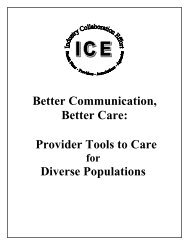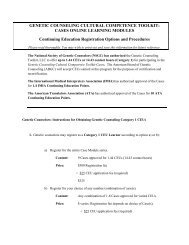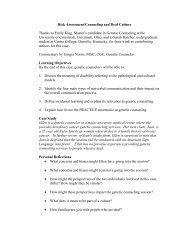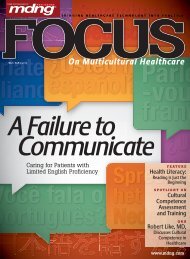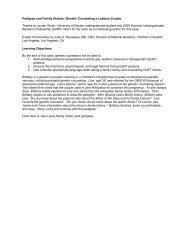Advanced Effective Communication, Cultural Competence, and ...
Advanced Effective Communication, Cultural Competence, and ...
Advanced Effective Communication, Cultural Competence, and ...
Create successful ePaper yourself
Turn your PDF publications into a flip-book with our unique Google optimized e-Paper software.
A Roadmap for Hospitals<br />
Appendix D: Laws <strong>and</strong> Regulations<br />
outlines areas of noncompliance <strong>and</strong> the corrective steps that the<br />
hospital must take. HHS will attempt to secure the hospital’s<br />
voluntary compliance through informal means.<br />
If HHS cannot resolve the matter informally, it will secure<br />
compliance through (a) the suspension or termination of Federal<br />
assistance after the recipient has been given an opportunity<br />
for an administrative hearing, (b) referral to the DOJ for<br />
injunctive relief or other enforcement proceedings, or (c) any<br />
other means authorized by law.<br />
HHS engages hospitals in voluntary compliance efforts <strong>and</strong><br />
provides technical assistance at all stages of an investigation.<br />
During these efforts, HHS proposes reasonable timetables for<br />
achieving compliance <strong>and</strong> consults with <strong>and</strong> helps hospitals<br />
explore cost-effective ways of coming into compliance. In determining<br />
a hospital’s compliance with the Title VI regulations,<br />
HHS’s primary concern is to make sure that the<br />
hospital’s policies <strong>and</strong> procedures provide meaningful access<br />
for LEP persons to the hospital’s programs <strong>and</strong> activities.<br />
Reviewing summaries of recent HHS Title VI settlement<br />
agreements can give a hospital greater insight into the types of<br />
activities that may or may not be considered compliant, enforcement<br />
activities, <strong>and</strong> results. The HHS Office for Civil<br />
Rights offers cases examples online that include settlements<br />
with hospitals <strong>and</strong> pharmaceutical benefit companies as well<br />
as state <strong>and</strong> country departments of social services. The experiences<br />
of the following organizations can be found online:*<br />
• The Office for Civil Rights conducted an investigation<br />
<strong>and</strong> subsequent compliance review concerning a<br />
complaint alleging that the Hawaii Department of<br />
Human Services (HDHS) denied an interpreter to an<br />
individual with limited English proficiency. HDHS<br />
signed, in August 2008, a voluntary resolution agreement<br />
acknowledging that LEP individuals need language<br />
assistance services to access <strong>and</strong> fully participate in<br />
programs <strong>and</strong> activities operated by HDHS. Serving a<br />
population of more than 1.2 million individuals, HDHS<br />
provides benefits <strong>and</strong> services throughout the state of<br />
Hawaii through its 4 divisions <strong>and</strong> 88 local offices located<br />
on 5 isl<strong>and</strong>s, including Temporary Assistance for Needy<br />
Families ( TANF), child <strong>and</strong> adult protective services,<br />
medical programs for low-income families including<br />
Medicaid, <strong>and</strong> home <strong>and</strong> community-based services<br />
Under the agreement, HDHS will, among other things,<br />
notify individuals with limited English proficiency of the<br />
availability of free language assistance, provide interpreters<br />
upon request, translate vital program documents, <strong>and</strong><br />
train HDHS staff on policies <strong>and</strong> procedures for<br />
communicating with <strong>and</strong> serving persons with limited<br />
English proficiency. HDHS agreed to submit semi-annual<br />
progress reports to the Office for Civil Rights for a period<br />
of three years.<br />
• In June 2009, Medco, the nation’s largest pharmacy<br />
benefit manager, dispensing more than one hundred<br />
million prescriptions a year through pharmacy, home<br />
delivery <strong>and</strong> mail order operations, took steps to<br />
implement a multi-faceted plan to improve services to<br />
individuals with limited English proficiency following an<br />
investigation by the Office for Civil Rights of a complaint<br />
filed on behalf of a Spanish-speaking member. Medco will<br />
exp<strong>and</strong> its pool of bilingual customer service<br />
representatives who speak Spanish <strong>and</strong> redesign its referral<br />
system to more quickly link Spanish-speaking members to<br />
bilingual staff. Medco will continue to use a telephonic<br />
interpreter service available for more than 150 other<br />
languages to improve communication with other LEP<br />
individuals <strong>and</strong> will make improvements to its internal<br />
computer systems to more quickly flag language<br />
preference <strong>and</strong> allow important written communications<br />
<strong>and</strong> outbound telephone calls to be made in a member’s<br />
primary language. Medco has also committed to<br />
developing an extensive evaluation process with respect to<br />
interpreter competency.<br />
Section 504 of the<br />
Rehabilitation Act of 1973 <strong>and</strong><br />
the Americans with Disabilities<br />
Act: <strong>Effective</strong> <strong>Communication</strong><br />
for People Who Are Deaf/Hard of<br />
Hearing<br />
With respect to language access for people who are deaf or hard<br />
of hearing, the vast majority of hospitals are subject to two different<br />
federal laws enforced by two different agencies (the DOJ<br />
<strong>and</strong> the HHS Office for Civil Rights) with respect to disability<br />
discrimination issues. Fortunately, the st<strong>and</strong>ards for effective<br />
communication under both laws are nearly identical.<br />
Section 504 prohibits discrimination against otherwise qualified<br />
people with disabilities under any program or activity that<br />
receives federal financial assistance [5]. Similar to Title VI,<br />
* See http://www.hhs.gov/ocr/civilrights/activities/examples/LEP/complaintcompliance.html.<br />
68




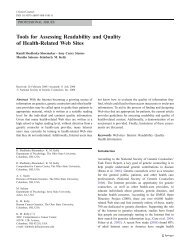

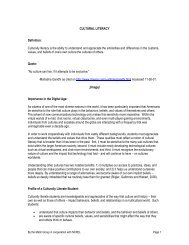
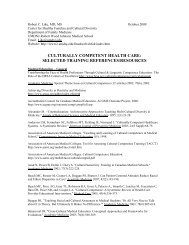

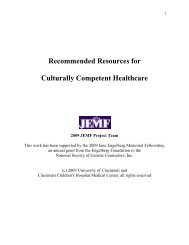
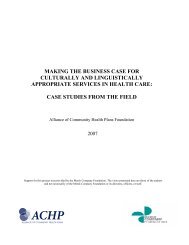
![Breaking Bad News PPT[1] - Genetic Counseling Cultural ...](https://img.yumpu.com/35003134/1/190x146/breaking-bad-news-ppt1-genetic-counseling-cultural-.jpg?quality=85)
